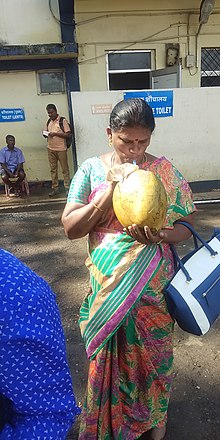innen
Dutch
Etymology
From Middle Dutch innen. Equivalent to in + -en.
Pronunciation
Verb
innen
Conjugation
| Conjugation of innen (weak) | ||||
|---|---|---|---|---|
| infinitive | innen | |||
| past singular | inde | |||
| past participle | geïnd | |||
| infinitive | innen | |||
| gerund | innen n | |||
| present tense | past tense | |||
| 1st person singular | in | inde | ||
| 2nd person sing. (jij) | int, in2 | inde | ||
| 2nd person sing. (u) | int | inde | ||
| 2nd person sing. (gij) | int | inde | ||
| 3rd person singular | int | inde | ||
| plural | innen | inden | ||
| subjunctive sing.1 | inne | inde | ||
| subjunctive plur.1 | innen | inden | ||
| imperative sing. | in | |||
| imperative plur.1 | int | |||
| participles | innend | geïnd | ||
| 1) Archaic. 2) In case of inversion. | ||||
German
Etymology
From Old High German innana.
Pronunciation
Adverb
innen
Antonyms
Derived terms
- Innenarchitekt, Innenbereich, Innendruck, Innendurchmesser, Inneneinrichtung, Innengewölbe, Innenhof, Innenkante, Innenminister, Innenministerium, Innenstadt
Related terms
Further reading
Hungarian
Alternative forms
- innét (folksy)
Pronunciation
Adverb
innen (not comparable)
Derived terms
Postposition
innen
Further reading
- innen in Bárczi, Géza and László Országh. A magyar nyelv értelmező szótára (“The Explanatory Dictionary of the Hungarian Language”, abbr.: ÉrtSz.). Budapest: Akadémiai Kiadó, 1959–1962. Fifth ed., 1992: →ISBN
Jarawa

Alternative forms
Etymology
Cognate to Önge inen-da (“a non-Onge, a foreigner”).
Pronunciation
Noun
innen
- non-Andamanese foreigner
- Antonym: əŋ (“Jarawa”)
- In particular, a foreigner of South Asian appearance as opposed to a Southeast Asian or European
Usage notes
This word is used to describe non-Andamanese foreigners, in opposition to the əŋ (“Jarawa”) and a third term referring to indigenous Andamanese who are not part of the Jarawa tribe. Most innen that the Jarawa encounter are of South Asian extraction, and they have more specific terms for Burmese and similar-looking people, and for people who resemble neither Indians nor Burmese (see the Report of the Expert Committee on the Jarawas of the Andaman Islands, 2003, Chapter 2).
There appears to be no linguistically precise transcription of these other terms.
References
- Kumar, Pramod (2012) Descriptive and Typological Study of Jarawa (PhD). Jawaharlal Nehru University. Page 62, passim.
Middle Dutch
Etymology
Verb
innen
Inflection
| Weak | ||
|---|---|---|
| Infinitive | innen | |
| 3rd sg. past | — | |
| 3rd pl. past | — | |
| Past participle | — | |
| Infinitive | innen | |
| In genitive | innens | |
| In dative | innene | |
| Indicative | Present | Past |
| 1st singular | inne | — |
| 2nd singular | ins, innes | — |
| 3rd singular | int, innet | — |
| 1st plural | innen | — |
| 2nd plural | int, innet | — |
| 3rd plural | innen | — |
| Subjunctive | Present | Past |
| 1st singular | inne | — |
| 2nd singular | ins, innes | — |
| 3rd singular | inne | — |
| 1st plural | innen | — |
| 2nd plural | int, innet | — |
| 3rd plural | innen | — |
| Imperative | Present | |
| Singular | in, inne | |
| Plural | int, innet | |
| Present | Past | |
| Participle | innende | — |
Descendants
Further reading
- “innen”, in Vroegmiddelnederlands Woordenboek, 2000
- Verwijs, E., Verdam, J. (1885–1929) “innen (I)”, in Middelnederlandsch Woordenboek, The Hague: Martinus Nijhoff, →ISBN, page I
Mopan Maya
Alternative forms
Pronoun
innen
References
- Hofling, Charles Andrew (2011). Mopan Maya–Spanish–English Dictionary, University of Utah Press.
Norwegian Bokmål
Etymology
Preposition
innen
Derived terms
See also
- innan (Nynorsk)
References
- “innen” in The Bokmål Dictionary.